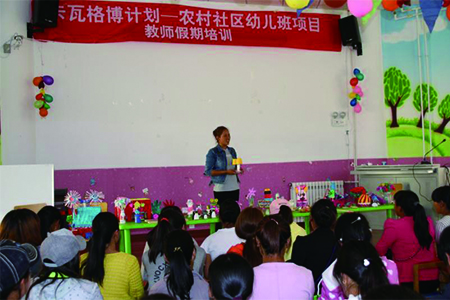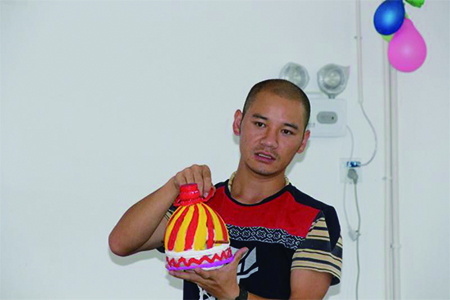Home \ Project News \ Building the Capacity of Preschool Teachers in POF North West
Li Yanmei is a Project Manager in Preschool of the Future (POF) North West Yunnan. She has attended different trainings related to preschool education. 2013/2014 she was trained in Project Management at Frontline Institute, Zimbabwe. Soon after her return she opened more than 10 new Preschools of the Future (POF) in Zhenkang County where she utilized the skills acquired in Zimbabwe. In January 2015 she went from Zhenkang County to North West Yunnan, where she was in the lead of starting new POF schools.
Here she tells us about a Preschool workshop which was held in Shangri La:
“The workshop lasted from the 15th to the 20th of August 2016. A total of 85 people attended this workshop. Initially we had planned the workshop to involve only our POF teachers but a neighboring school in Sanba Township heard that we had such a workshop and they showed much interest. They asked if they could participate in this workshop as they are interested in the way we conduct our trainings and believe their teachers can learn from it. We were happy for their request and they sent 20 teachers to attend the workshop. Ole Bloch from the Humana People to People Kunming Project Service Center, Qian Lihua , the headmistress for Sanba preschool, Program Developer Xiao Yang from the Project Service Center, 2 invited teachers, Tang Yan from Kunming Vocational Skills Inspection Center and Li Jie from Kunming Donghua Kindergarten), 6 Project Office staff and 57 POF teachers from our preschools including 21teacher assistants attended the workshop.
The training contents consisted of 1) How to give good outdoor lessons. 2) How to take care of the children’s safety. 3) How to give First Aid. 4) How to sterilize dining equipment. 5) How to make toys out of simple equipment. 6) Making plans for the coming semester, both monthly and weekly plans.”
(Teacher sharing teaching experiences)
Why did you decide to have such training?
“During the last semester a lot of progress happened, but also some areas were lacking behind. We wanted to let the teachers recognize the progress, but also to address the challenges, to discuss how to improve and how to do many more of the good things we had done. The workshop was an opportunity for us to conclude on the last semester’s activities and help our teachers improve their skills. We also wanted to focus on how the teacher can cooperate and interact with the parents. It is important that the teacher and parents work together, because they are both involved in the upbringing and education of the preschool children. To help the children to succeed this co-operation is very essential.
I am happy to say this workshop was a success. The teachers actively participated during the training. I believe they learned a lot from the 2 teachers from Kunming because they demonstrated a lot of different skills, for example making good training materials and good outdoor lessons. The 2 teachers have vast experience from teaching at the university and at the kindergarten. During this coming semester I look forward to see our teachers utilize the skills they learned, this will also mean a lot to our preschool children. I also hope, by using the new skills in cooperation with the parents, that it will greatly help our children, because if there is a challenge with some of the children, the teachers and parents will stick together in finding solutions.”
(A beautiful toy made by the teacher from Kunming)
(Working in small groups on new handicraft skills)
Brief introduction of the project:
The case story comes from Yunnan Kawadgarbo Initiative Preschools of the Future project. The project is implemented in the North West of Yunnan and is supported by UBS Optimus Foundation with cooperation from China Social Welfare Foundation and Right to Play (China). The project aims to establish an effective early education system in remote rural areas, so that to promote integrated development of the early child education in local.
Disclaimer:
This project is funded by UBS Optimus Foundation (www.ubs.com/optimus), the foundation has a strategic partner - China Social Welfare Foundation.
Content in this article reflects the views of the authors and not those of the funder.